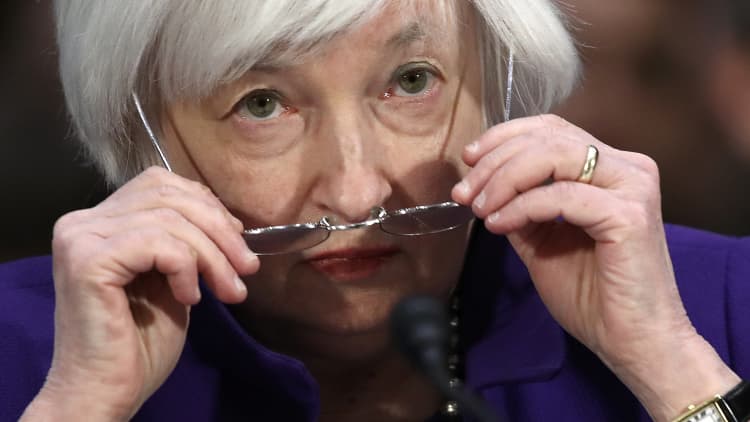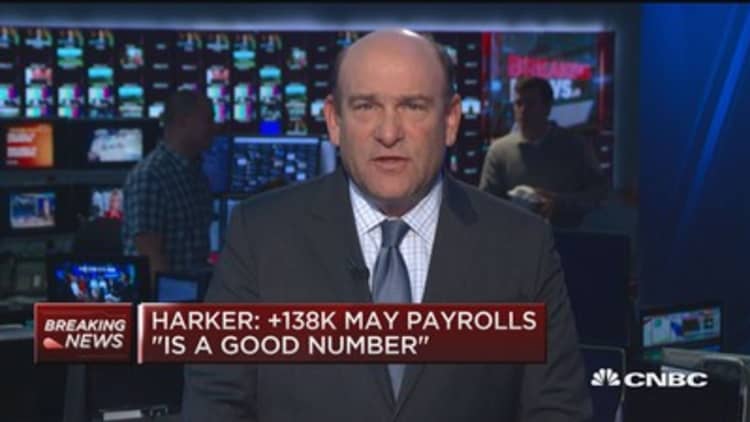
President Donald Trump appears ready to remake the Federal Reserve in an image that will be considerably different than what investors have known for many years.
The president is prepared to nominate Randal Quarles and Marvin Goodfriend to two of three vacancies at the central bank, according to multiple press accounts that have not been disputed by the administration. Quarles likely would assume the role vacated by Daniel Tarullo to oversee the nation's banking system. White House officials did not respond to a CNBC request for comment.
Should Trump nominate the two men and they receive confirmation, it will represent the first steps in a possible substantial remaking of a Fed that has practiced ultra-loose monetary policy for the past decade but has been tight on banking regulations.
Trump will have the opportunity to name one more person now, then can fill two even more critical vacancies in 2018 — that of Chair Janet Yellen and Vice Chair Stanley Fischer.
If the Quarles and Goodfriend moves are indicators of what's to come, things could start getting less comfortable for Yellen. Both are considered solidly conservative, in line with the Republican president and Congress but perhaps not with Yellen.
"Clearly, these appointees are a significant departure from the crowd that we've had on the board," said Christopher Whalen, head of Whalen Global Advisors and a former investment banker and long-time financial analyst. "Yellen is probably the most left-wing Fed chair we've ever had. I also think both Quarles and Goodfriend have
Yellen, however, may not think so, particularly if the coalition she has carefully crafted since taking the chair's seat in 2014 starts to unravel.
"I welcome these additions," Whalen said. "Hopefully they put a banker in the third slot. Then eventually Yellen's going to leave because she's going to start losing votes."
Conservative roots
Quarles currently heads a private investment firm called the Cynosure
As for Goodfriend, he's known as "a heavyweight conservative economist," said Krishna Guha,
Being that Goodfriend is known to not be a fan of the easing programs the Fed instituted to spark the economy, is "skeptical" of the central bank's plan to roll off its $4.5 trillion bond portfolio, and is likely to favor a rules-based approach to setting policy, that could set up further conflicts. Goodfriend did not respond to a request for comment.
"Interestingly, these nominations would not on the face of it be consistent with the notion that Trump will seek to foster low rates and a weaker dollar by nominating doves," Guha said in a research note. "Whether this is a strategic choice or an unintended consequence at a time when the administration is consumed by multiple dramas is hard to tell at this juncture."
Indeed, the appointments come at a critical time for the Fed.
The Federal Open Market Committee is in the early stages of a rate-hiking program set to normalize policy after the extremes from the financial crisis. In addition, officials in coming days will be rolling out a plan to unwind the bond portfolio often referred to as the Fed's balance sheet.
A Fed suddenly not of one mind, as has been the case for most of the post-crisis years, will present challenges.
"I don't think they're overly
The regulatory landscape
On the regulatory side, Gardner said the two men would accelerate a Trump administration push to make rules friendlier for
In the wake of the crisis, the Fed was charged with enforcing a more stringent set of rules, buttressed by the Dodd-Frank reforms that sought to make banks hold more capital and take fewer risks. Gardner believes the toughest rules, for so-called systemically important financial institutions, or SIFIs, would get relaxed for nonbulge bracket banks.
"They're going to spend a lot of their time and efforts on an even
Others believe the changes could be more sweeping.
Analysts at Compass Point Research point to a statement from Quarles calling Dodd-Frank "a failure of ambition" and a "concession to inappropriate pressures."
"Our view remains that Mr. Quarles would use his post as vice chair for supervision to orchestrate a broad deregulatory agenda for the nation's banks, with a focus on increasing stress test transparency, altering the Volcker Rule, and securing relative regulatory relief for regional/community banks," Compass Point said in a note.
The Volcker Rule prohibits banks from trading for their profit, but has been criticized as vague and targeted for alteration or elimination.
As for the markets, getting rid of the target painted on banks since the crisis could be of some help. Bank stocks soared after Trump's election but have cooled off considerably since then. Financials were the best performers in Monday trading, perhaps taking at least some solace in getting a better indicator of what the future Fed will look like.
The appointments would bring "some certainty and finality," Gardner said. "I don't think it gives some kind of unique boost to bank stocks, just some sigh of relief of finally getting people in place and getting a feeling for who the president is going to nominate."
Watch: Philly Fed's Harker comments on jobs creation



